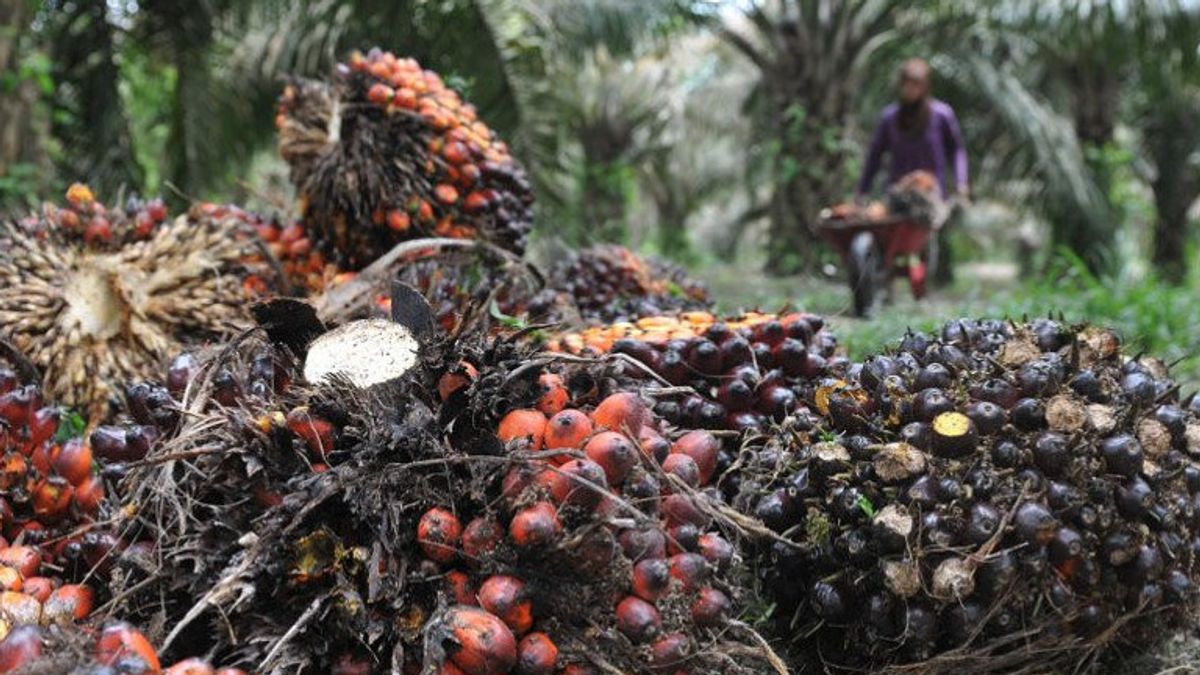JAKARTA - Economists believe that Indonesia's palm oil donation in meeting the needs of global vegetable oil is still dominant and has not been replaced. Although, next year there will be expectations of a decrease or normalization of commodity prices.
Deputy Director of the Institute for Development of Economics and Finance (Indef) Eko Listiyanto explained that currently, the productivity of palm oil as vegetable oil cannot be replaced by vegetable oils from other types of plants. This condition is believed to still not change next year.
"(In 2023), palm oil will still dominate (compared with other vegetable oils)," he explained to reporters in Jakarta, Wednesday, November 23.
The Palm Oil Resulting State Council (CPOPC) noted that palm oil production (CPO) in the 2022/23 period was 79.16 million metric tons. Indonesia contributed about 58 percent or the equivalent of 46.5 million metric tons to the world's total supply of palm oil.
The total production of palm oil is more than the supply of other major vegetable oils, such as from solar flower seeds (20.14 million metric tons); rapeed (31.53 million metric tons); and soybeans (61.9 million metric tons).
Overall, the US Department of Agriculture (USDA) predicts that global production of vegetable oil in 2022/23 will amount to 219.8 million tons. This number increased 8.3 million tons compared to the previous harvest year. USDA hopes that this production can cover demand which is estimated to reach 213.6 million tons in the current harvest year.
Although, he admitted, the CPO price in 2023 will not be as high this year as it is because the peak moment of rising commodity prices has fallen. Reuters noted, until November 17, 2022, the price of Malaysian futures palm oil fell to RM3,850/ton or -22.97 percent (yoy).
The same thing was voiced by University of Indonesia (UI) Economist Telisa Falianty. He assessed that, with more than half of the world's palm oil supply depending on Indonesia, the world will also be affected if there is a shock in the Indonesian palm oil industry.
Therefore, Telisa reminded, the legal process related to the palm oil industry in large quantities could potentially disrupt or cause shocks to the palm oil industry, even though it is temporary. Because legal cases can have an impact on sudden changes in temporary regulations.
"For example, the regulation on the ban on CPO exports and its derivatives on April 28, 2022, caused various impacts such as the decline in world CPO prices, the global supply shortage of CPO, and the excess supply of domestic CPO," Telisa told reporters, on a separate occasion.
For Indonesia itself, the palm oil industry has an important role. So far, palm oil production has contributed 82 percent of the total plantation crop production, so the share of plantation plantation plantation GDP is quite large. The plantation plantation plantation GDP in Q2-2022 grew 0.27 percent (yoy).
The palm oil industry also involves a large number of workers. In 2021 alone, according to BPS, there are 2,892 large oil palm plantation companies. This number is much larger than other plantations, including rubber plantations which reached 324 companies.
"Because the oil palm processing process requires a long process, so many workers are involved in the industry. In addition, farmers and freelance workers are also very affected," he said.
Referring to data from the Ministry of Agriculture (2019), the number of farmers involved in palm oil is 2,673,810 people. Meanwhile, the number of workers working in oil palm plantations is 4,425,647 workers. Therefore, Telisa hopes that the positive trend of the palm oil industry can be maintained. Because if the palm oil industry collapses, it will trigger a large wave of layoffs.
Meanwhile, Member of Commission IV of the House of Representatives from the PKB faction, Daniel Johan, is confident that the palm oil industry will continue to advance as long as the law is properly enforced.
"Law enforcement is something that must be done, what is important is to carry out professionally and not seek. Law enforcement must be a complete part of legal certainty," said Daniel.
Daniel reminded that the palm oil industry is very strategic and strengthens Indonesia's position in front of the world. Therefore, in addition to continuing to strengthen downstream, the government must also be able to place Indonesia as the determinant of world palm oil prices. He explained that the palm oil industry involves various strategic products such as food, clothing, and world energy.
"Indonesia's current growth can still be positive and the trade balance can be in surplus, yes, because oil palm is one of them. So, if this industry is shaken then the opposite will happen," he said.
Member of Commission VII DPR RI Mulyanto also reminded the same thing. He observed that state revenues from the palm oil industry can be relied on after coal.
"Our palm oil industry continues to grow. And the differentiation of derivative products day by day is increasing. Employment absorption is also increasing," said Mulyanto.
It's just that, according to his observations, what is now a problem is that the price of palm oil in the domestic market is relatively high. This was observed because of the oligopolistic market.
"This needs to be arranged by the government. Including building palm oil factories by people's cooperatives, BUMD/N. This will certainly absorb more labor," he explained.
The English, Chinese, Japanese, Arabic, and French versions are automatically generated by the AI. So there may still be inaccuracies in translating, please always see Indonesian as our main language. (system supported by DigitalSiber.id)










